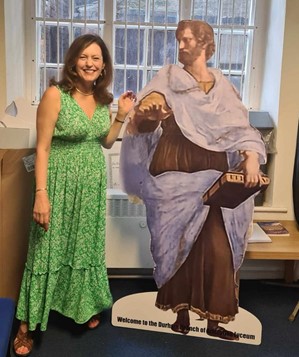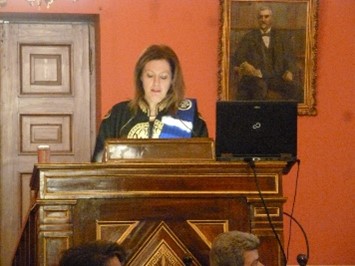
Edith Hall
I am absolutely delighted that the ERC reviewers and UKRI funders have made it possible for me to lead this intensive five-year project, which has been an aspiration since I was an undergraduate and attended Sir Kenneth Dover’s brilliant lectures on Greek Prose Style. In 1988, as a Junior Fellow at Cambridge University, I delivered a lecture course on Greek Prose Style there; I was told by the Aristotelian Jonathan Barnes at a seminar that he was struck that Aristotle had written poetry and that he regretted the absence of a study of Aristotle’s prose style ‘by a scholar like you who has been trained in literary analysis’. He later expressed a widely held view that parts of the treatises ‘were made up from lecture notes’, but that, nevertheless, Aristotle ‘could write finely’, parts are done ‘with power and even with panache’ and that his prose was both ‘sinewy’ and ‘allusive’.[1] I became convinced that it was a matter of urgency to analyse Aristotle’s prose style in his extant treatises and test the hypothesis that most of them were written to further the clarity and cogency of his philosophical arguments with literary acumen and attention to detail: as Natali has put it in a rare appreciation of some rhetorical features of Nicomachean Ethics, they ‘represent the result of conscious reflection and careful planning’.[2]
It would after all be strange if this were not so. Aristotle not only wrote a treatise entitled Poetics, which advanced the study of verse genres immeasurably and divorced the art/science of poetry (poiētikē technē) from the political sphere. He also wrote the earliest surviving handbook for writers of speeches and other forms of discourse in prose, the Rhetoric. In its Book III he lays out detailed instructions for crafting a prose style suited to each genres, including educational treatises. Here he stresses that ‘in every system of instruction there is some minor obligation to pay attention to style (lexis); for it does make a difference, for the purpose of making a thing clear, to speak in this or that manner’ (III.1404a). Yet he concedes that, for example, geometry teachers do not concern themselves with elaborate crafting of their didactic prose. Since Aristotle wrote highly technical treatises on formal logic and natural science as well as elaborate works on questions of moral, political and metaphysical philosophy, it his hardly surprising that he would think hard about which style would most enhance his over-riding goal of achieving clarity (saphēneia) of argumentation and exposition across the diverse range of subject-matter which he researched, taught, pondered and wrote about.
The word pezographos (prose-writer) is primarily used when a distinction is being made between writers who do and do not use poetic metre (e.g. Diog. Laert. IV.2.15, of the major Platonist Xenocrates who should apparently not have attempted to write elegiac poetry!) Aristotle’s preferred term is psiloi logoi, ‘bare’ or ‘naked’ words, but this is itself ambiguous. Although it is used of language without metre, it can also imply purity (e.g. of water when unalloyed with wine) or be used where an effect of simplicity masks the skill and effort which created it (e.g. of the smooth, dense pile of Persian carpets). Aristotle’s theory of persuasion in Rhetoric presupposes that effective prose may have a distinctive flavour, but that the required artifice must be concealed (III.1404b). The distinctiveness must appear ‘natural’ rather than artificial (μὴ δοκεῖν λέγειν πεπλασμένως ἀλλὰ πεφυκότως): ‘for that which is natural persuades, but the artificial does not. For men become suspicious of one whom they think to be laying a trap for them, as they are of mixed wines’.
Revealingly, Aristotle here adduces the example of the nonpareil Athenian fourth-century tragic actor, Theodorus, who stood out from others because his voice seemed to be the authentic voice of the character he was playing. Concealing the artistry in prose is likened to a skilled and trained actor feigning what sounded natural. I believe that Aristotle has misled many of his readers into thinking he simply recorded the speech that came naturally to him, as Theodorus took in his audience by speaking so plausibly in an entirely different persona.

I’ve spent 30 years honing skills in the analysis of ancient literature, with my primary interest being ancient Greek drama, although I have always maintained her interest in prose, publishing on pseudo-Lucian, Greek oratory, Hellenistic rhetoric, Aesop, ancient library culture, Xenophon, Herodotus, Plutarch, Thucydides, Lysias and Plato, plus a much-translated public-facing monograph, Aristotle’s Way (2018) and articles on Aristotle’s use of theatrical quotations outside Poetics and on the epideictic style and avoidance of dialectic in his exoteric works.[3] Other research projects I lead or have led include the Archive of Performances of Greek & Roman Drama (APGRD) at the University of Oxford, Classics and Class, Advocating Classics Education and (also at Durham University) Aristotle beyond the Academy. I have supervised 35+ PhD students and would welcome expressions of interest in graduate study related to this latest project. I have always emphasised that Aristotle transcends disciplinary boundaries, for example in my now published lectures on receiving the Erasmus Medal of the European Academy in 2015 and my Hon. PhD from Athens in 2017.

My Project Monograph: Aristotle's Literary Art: Illustration, Comparison, Allusion
I’m interested in Aristotle’s illustrations of his philosophical arguments through metaphor, simile, imagery and literary allusion. It will explore his sensitivity to his place in the history of literature, especially in relation to Homer, theatrical poetry and Plato, and how he modifies and enriches an inherited repertoire of imagery, paradigm and allusion.
As the founder of detailed study of metaphor (a category to which he subsumes similes), discussed in both Poetics and Rhetoric, he argues that it is essential for authors of both poetry and prose to master, but that it requires an ability, which cannot be taught, for identifying similarities. ‘Metaphor’ at its best vividly ‘puts before the eyes’ a concrete picture, as at HA 6.18 when wild boars prepare for battle ‘they put on armour breastplates’ by toughening up their hides, which makes the reader see them like hoplites readying themselves for combat.
Aristotle’s literary quotations and allusions have hardly begun to be investigated, despite the ancient perception, discernible in e.g. Neoplatonic doxography, that Aristotle and the other Peripatetics were well-read ‘literary’, even ‘bookish’ authors,[4] and Halliwell’s observation that Aristotle ‘cites and quotes poetry regularly in his own writings in ways which indicate the influence on him of a prevailing mentality that regarded poets and philosophers as pursuers...of a common wisdom.’[5]
Fables, anecdotes and references to historical figures current in popular and/or intellectual culture, such as ‘The toper of Byzantium’ or Cheiron, but without specified or known sources, also abound in Aristotle, especially in works on Ethics and Zoology and near the beginning and end of treatises. The story of Solon and Croesus gives ring composition to NE and the idea of the relation between time and change which opens Phys. IV (218b) is illustrated by the story of men who ‘slept with the heroes’ in Sardinia and were unaware of changes which had taken place while they slept. In MA the myths of Tityus, Boreas and Atlas Tityus, Boreas and Atlas aid consideration of motion and stillness.
I’m also convinced that Aristotle’s ethical theory was substantially built on examples of human behaviour in both tragic and comic theatre. Citations in Rhetoric suggest that Aristotle had paid attention to live delivery of both tragedies and comedies in the Athenian theatre during his extended periods of residence in that city, 367-347 BCE and 335-323. The latter period was during Lycurgus’ government and the creation of canonical texts of the great tragedians (long ago linked by Jaeger with Aristotle’s work on theatre texts[6]). Aristotle’s lost works include On Tragedies, Victories at the Dionysia, and Didaskaliai (Diog. Laert. 5.1.22-7), revealing his project of a comprehensive chronological record of the results of the dramatic competitions at Athens, possibly in collaboration with Lycurgus.
[2] Carlo Natali (2007) ‘Rhetorical and scientific aspects of the ‘“Nicomachean Ethics’“‘, Phronesis, 52364-381.
[3] Most of these publications can be downloaded and read on my personal website. They include:
2020 ‘Actors and Theatre in Aristotle’s Rhetoric and Beyond’, in G. Moretti and Biagio Santorelli (eds.) Atti Il Teatro dell’ Oratoria (= Maia suppl).
2020 ‘Aristotle’s Lost Works for the Public & the Politics of Academic Form’, in Phiroze Vasunia (ed.) The Politics of Form in Greek Culture. London: Bloomsbury.
2019 ‘Aristotle’s Example to Public Philosophy Today’, Aeon online.
2018 ‘Why read Aristotle today?’, Aeon online.
2017 ‘Aristotle’s Theory of Katharsis in its Historical and Social Contexts’, in E. Fischer-Lichte & Benjamin Wihstutz (eds.) Transformative Aesthetics. London: Routledge.
2017 ‘Aristotle as Role Model for the 21st-Century Academician’, European Review 25, 3-19.
2016 ‘Citizens but Second-class: Women in Aristotle’s Politics’, in Patriarchal Moments ed. Cesare Cuttica and Gaby Mahlberg, 35-42. Bloomsbury.
2011 ‘The Social Significance of Aristotle’s “Unity of Time”, Atti Acc. Pont. suppl. 60, 145-54.
[4] Carlo Natali, Aristotle, His Life and School (rev. ed., Princeton, NJ: Princeton U.P., 2013) 96-7.
[5] S. Halliwell, ‘The subjection of muthos to logos: Plato’s citations of the poets’, CQ 50 (2000) 94-112, at p.94.
[6] W. Jaeger, Aristoteles: Grundlegung einer Geschichte seiner Entwicklung (Berlin: Weidmann, 1923) 348-9. The ancient source for Lycurgus’ theatre reforms is [Plutarch], Lives of the Ten Orators 841f.